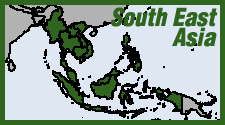 After weeks of escalating tensions along the remote mountain border, a Burmese MiG-29 fighter jet carried out an air-strike on Chinese territory March 13, killing four people working in a sugar-cane field in Yunnan province. Chinese authorities stepped up security along the border and registered a diplomatic protest. Burma, after initially denying everything, issued a statement expressing "deep sorrow" over the deaths. But Beijing says there have been at least three similar incidents of bombs from Burmese government forces falling in Chinese territory in recent weeks, and warned of "decisive" measures if there were any more. This all concerns the fast-escalating war in Burma's northern Shan state, where the rebel army of the Kokang ethnicity has again taken up arms against the government. More than 50,000 people—mostly Kokang—have fled the fighting into Chinese territory since the war was re-ignited earlier this year, and Burma accuses local military commanders in China of allowing the rebels to establish a staging ground in the border zone. (BBC News, March 16; Al Jazeera, March 15; Reuters, IBT, March 14)
After weeks of escalating tensions along the remote mountain border, a Burmese MiG-29 fighter jet carried out an air-strike on Chinese territory March 13, killing four people working in a sugar-cane field in Yunnan province. Chinese authorities stepped up security along the border and registered a diplomatic protest. Burma, after initially denying everything, issued a statement expressing "deep sorrow" over the deaths. But Beijing says there have been at least three similar incidents of bombs from Burmese government forces falling in Chinese territory in recent weeks, and warned of "decisive" measures if there were any more. This all concerns the fast-escalating war in Burma's northern Shan state, where the rebel army of the Kokang ethnicity has again taken up arms against the government. More than 50,000 people—mostly Kokang—have fled the fighting into Chinese territory since the war was re-ignited earlier this year, and Burma accuses local military commanders in China of allowing the rebels to establish a staging ground in the border zone. (BBC News, March 16; Al Jazeera, March 15; Reuters, IBT, March 14)
All this puts Beijing in a hell of a pickle, as a traditional ally and sponsor of the Burmese regime—and all the more so because the Kokang people are ethnic Han Chinese. Pressure from below is mounting on China's rulers to ditch the Burmese government and come to the aid of the Kokang. New York Times' Sinosphere blog is noting that users of Sina Weibo (China's answer to Twitter) have been posting grisly pictures of Kokang corpses from the counterinsurgency war in Shan state, with messages like "Let us help Kokang," and "The beasts of the Myanmar Army are continuing to slaughter Kokang's Chinese in Laukkai." (Myanmar is what Burma's then-dictatorship officially renamed the country in 1989; Laukkai is the capital of the Kokang autonomous region in Shan state.) In a Lunar New Year message last month, the military commander of the Kokang rebels, Peng Deren, thanked Chinese Internet users for their support.
Peng is the son of the rebels' longtime overall political leader Peng Jiasheng—who, as Voice of America reminds us, was identified by the US Drug Enforcement Agency (DEA) as a "major trafficker" in the region as early as 1975. The rebels say they now oppose the opium trade (for centuries the economic mainstay of Burma's mountain north), and are cooperating in eradication efforts.
But a key to understanding what has set off the new fighting in Kokang country may lie in the Feb. 23 arrest in Yangon, Burma's capital, of Li Guoquan, a prominent ethnic Chinese "businessman," on unspecified charges. On March 9, he just as mysteriously died in custody—with Radio Free Asia citing dissident sources that he was tortured and suffered "serious damage to internal organs.” RFA also tells us that Li was Peng Deren's brother-in-law, and was suspected of financing the Kokang rebels, officially known as the Myanmar National Democratic Alliance Army (MNDAA). Burma's The Irrawady reports that the MNDAA has denied any dealings with Li, but this seems rather perfunctory.
Whether or not Li's "business" dealings included opium, it is clear that control of the illicit trade has long been fueling the cycle of pacification and rebellion among the ethnic armies of Burma's north. In bids for peace, sucessive regimes have cut deals with the rebel armies for sharing the opium proceeds, then falling out over terms and returning to war. What makes it especially dangerous this time around is the involvement of China—with the potential to internationalize a conflict long hidden from the outside world.
Cross-post to High Times







Recent comments
4 weeks 3 hours ago
4 weeks 9 hours ago
7 weeks 1 day ago
8 weeks 9 hours ago
12 weeks 16 hours ago
15 weeks 6 days ago
19 weeks 6 days ago
20 weeks 4 days ago
30 weeks 4 days ago
34 weeks 5 days ago